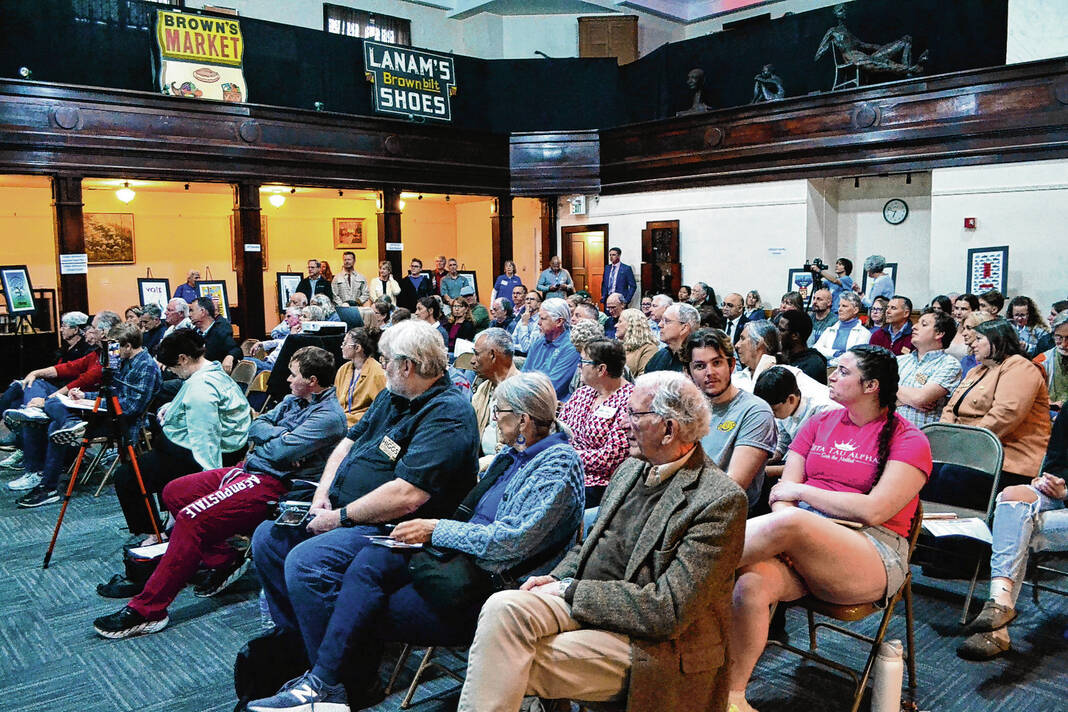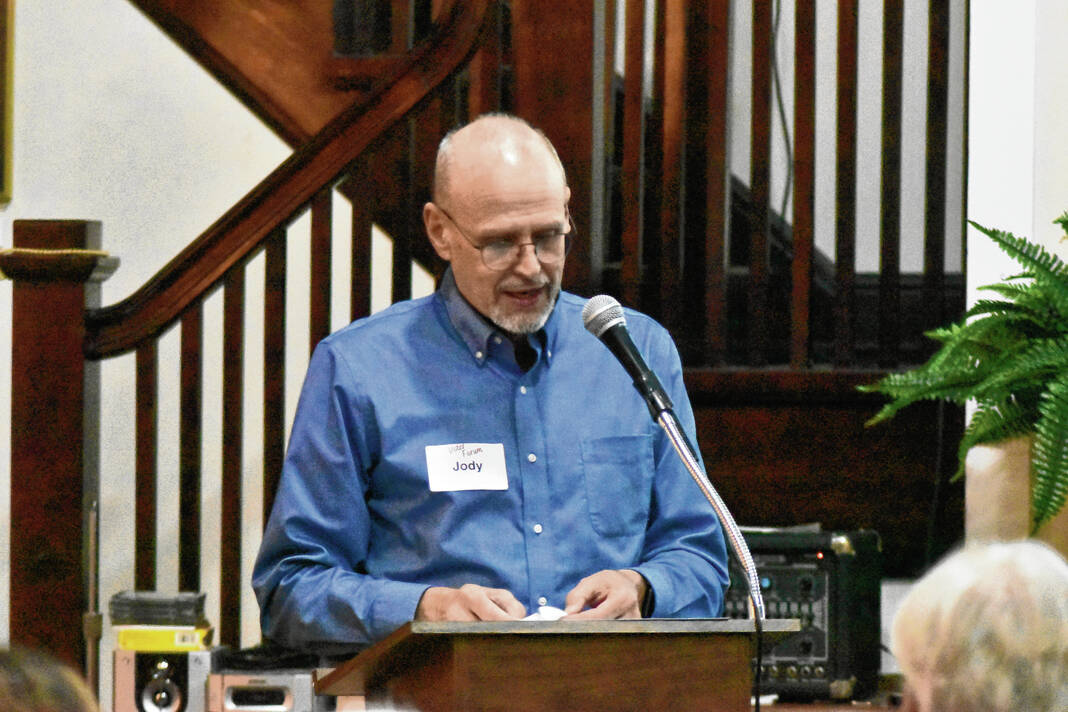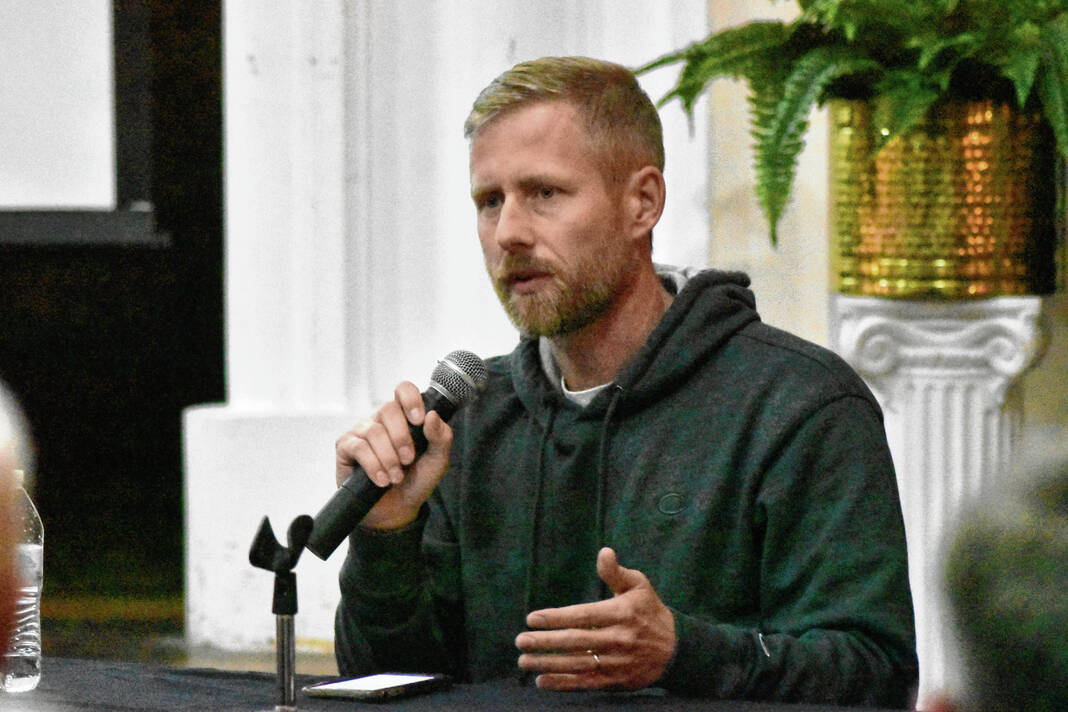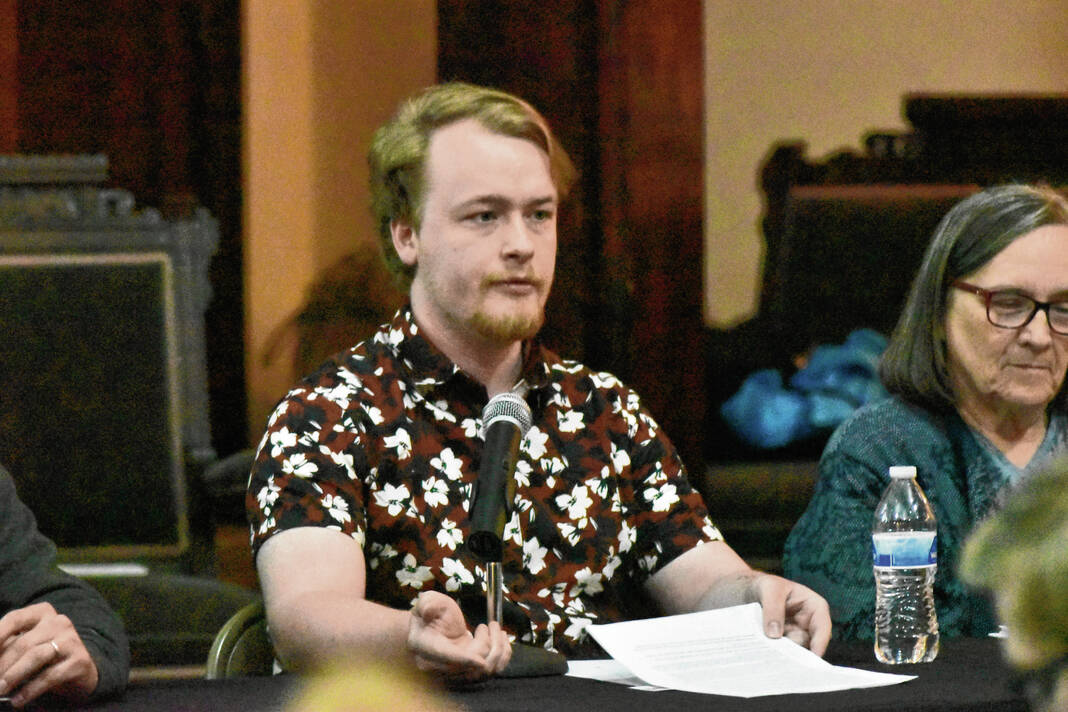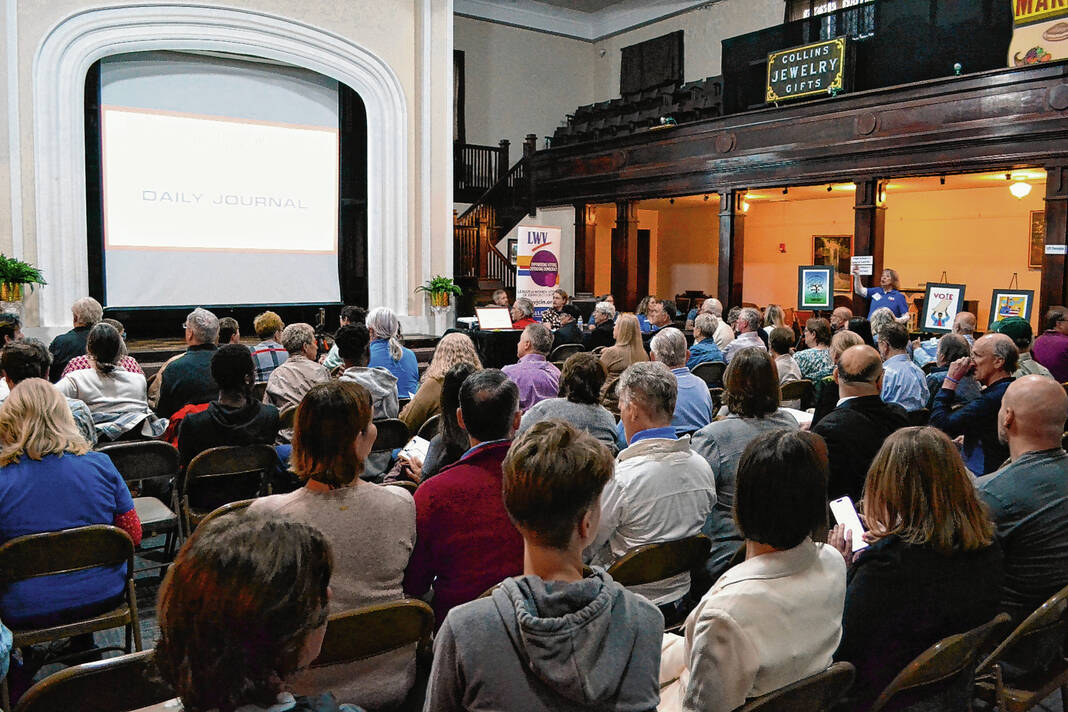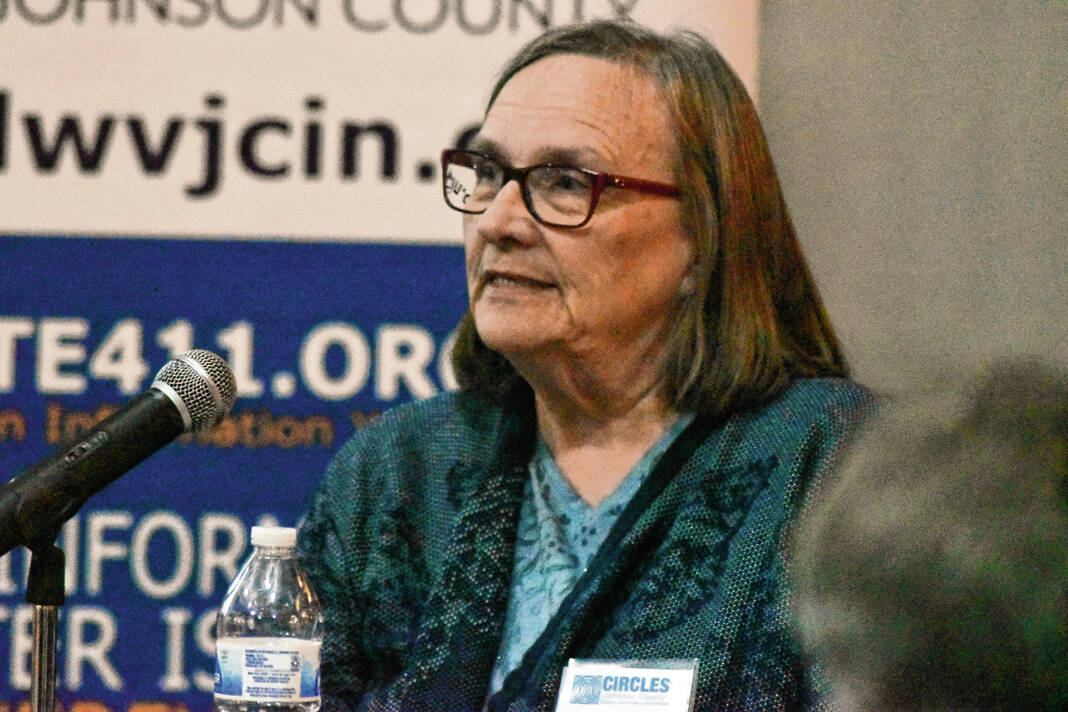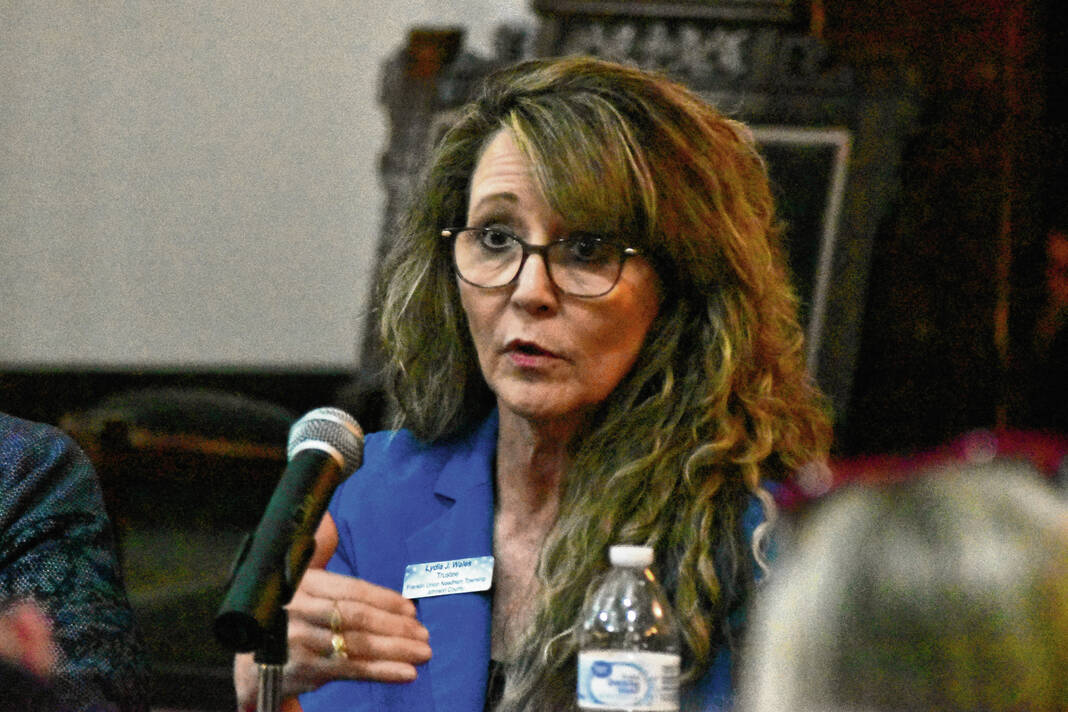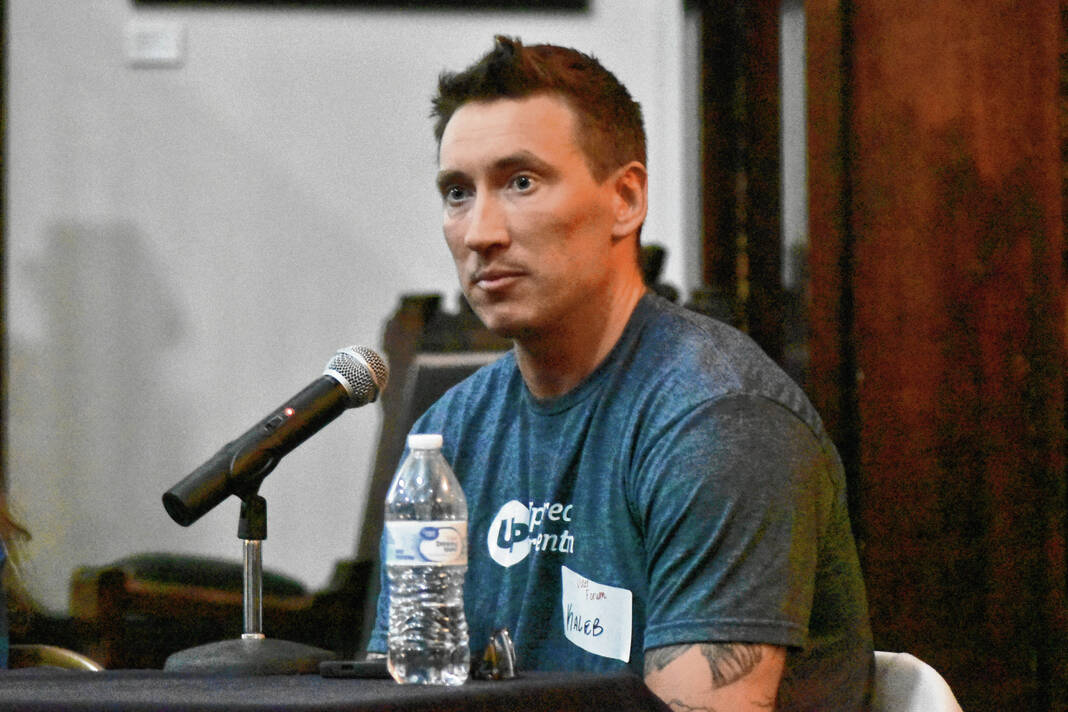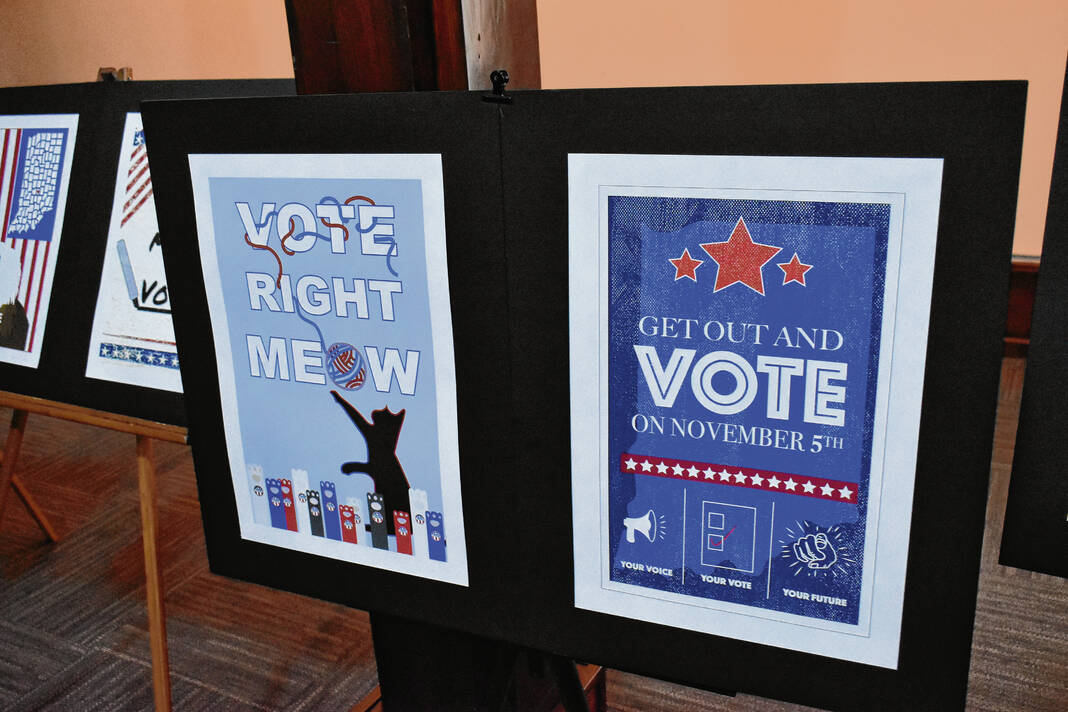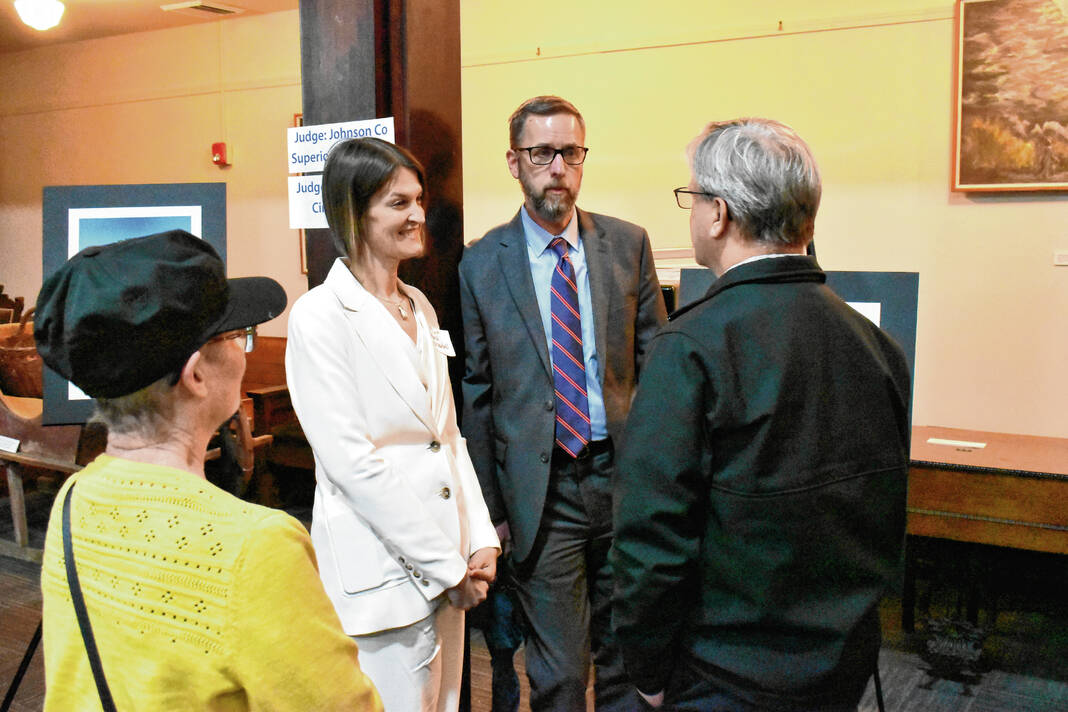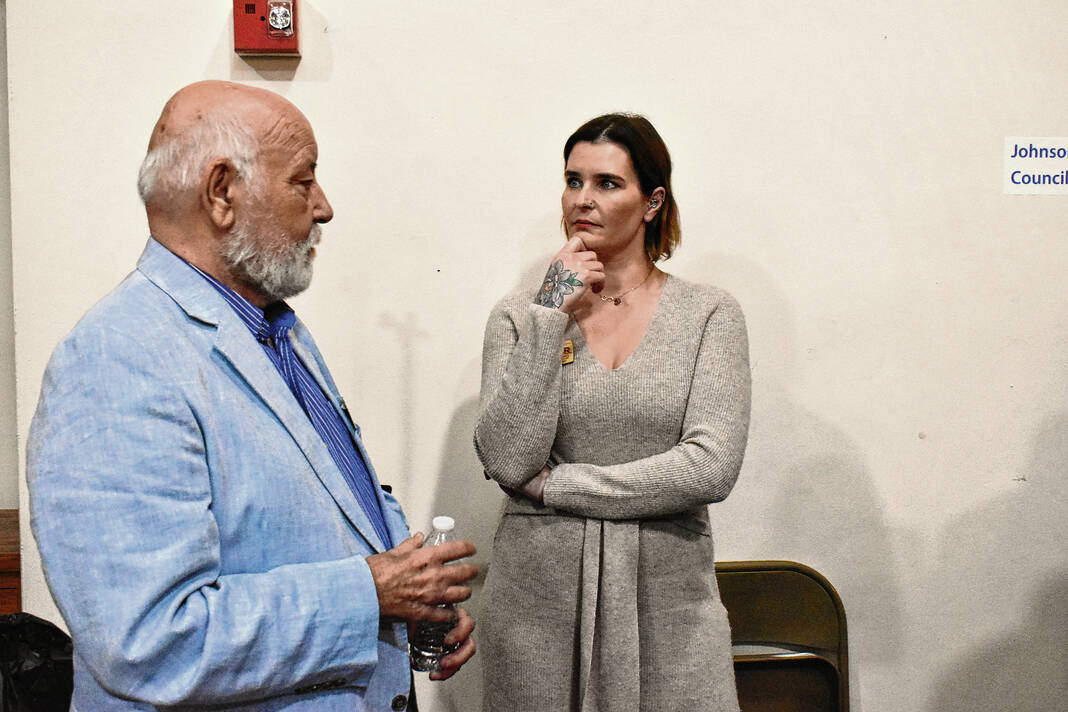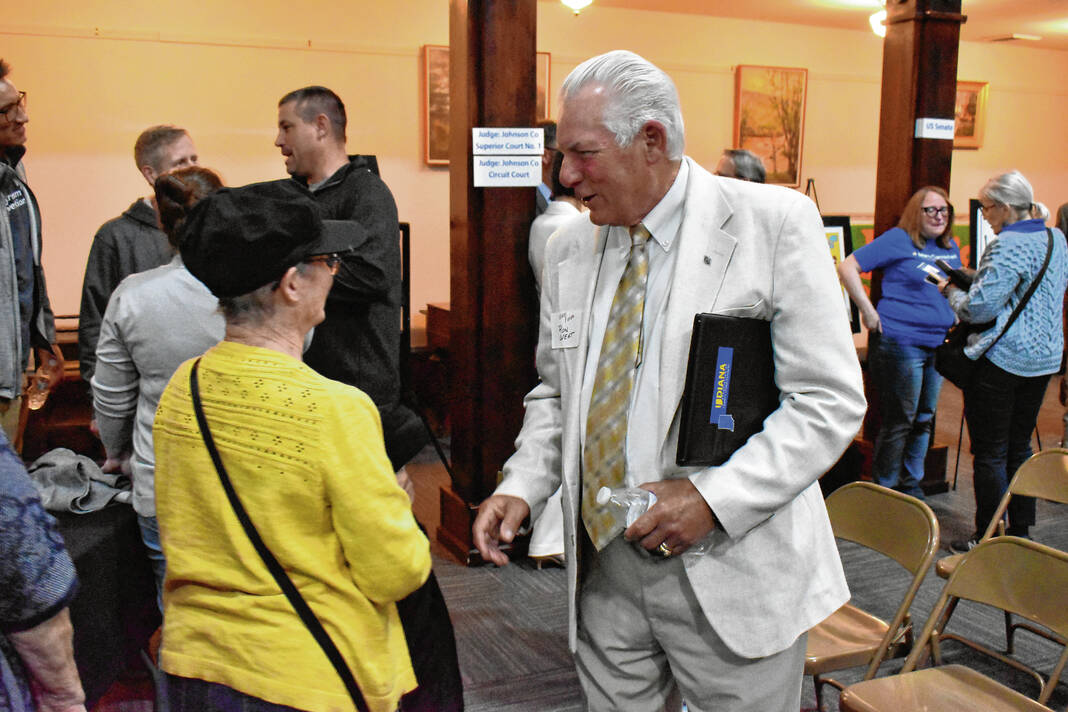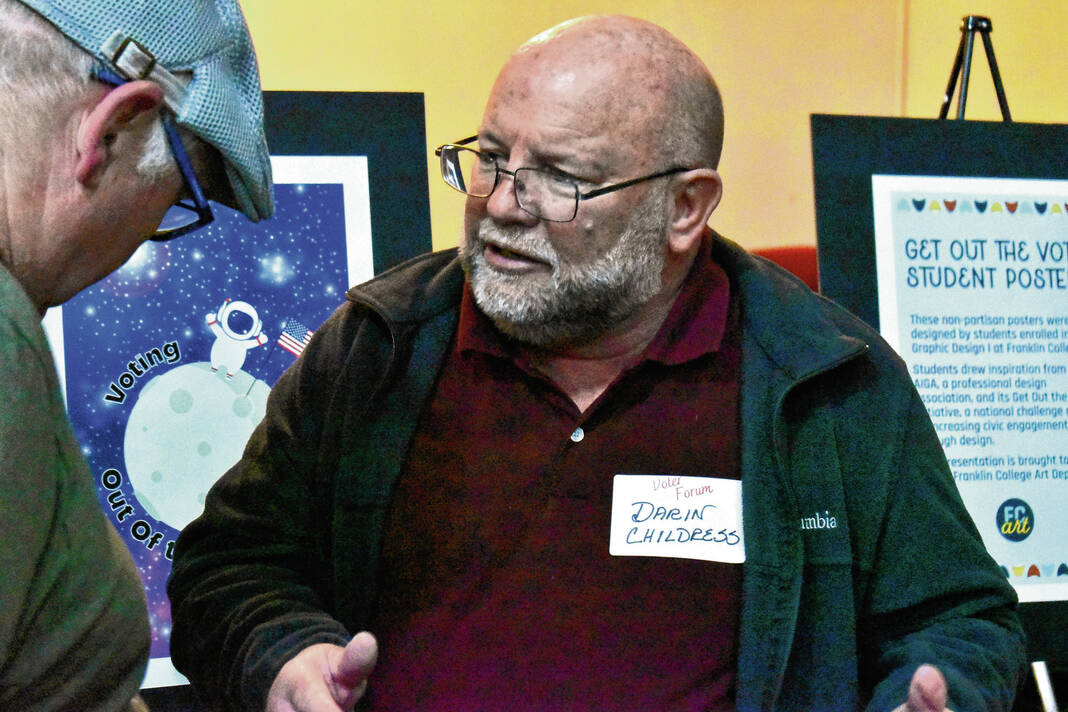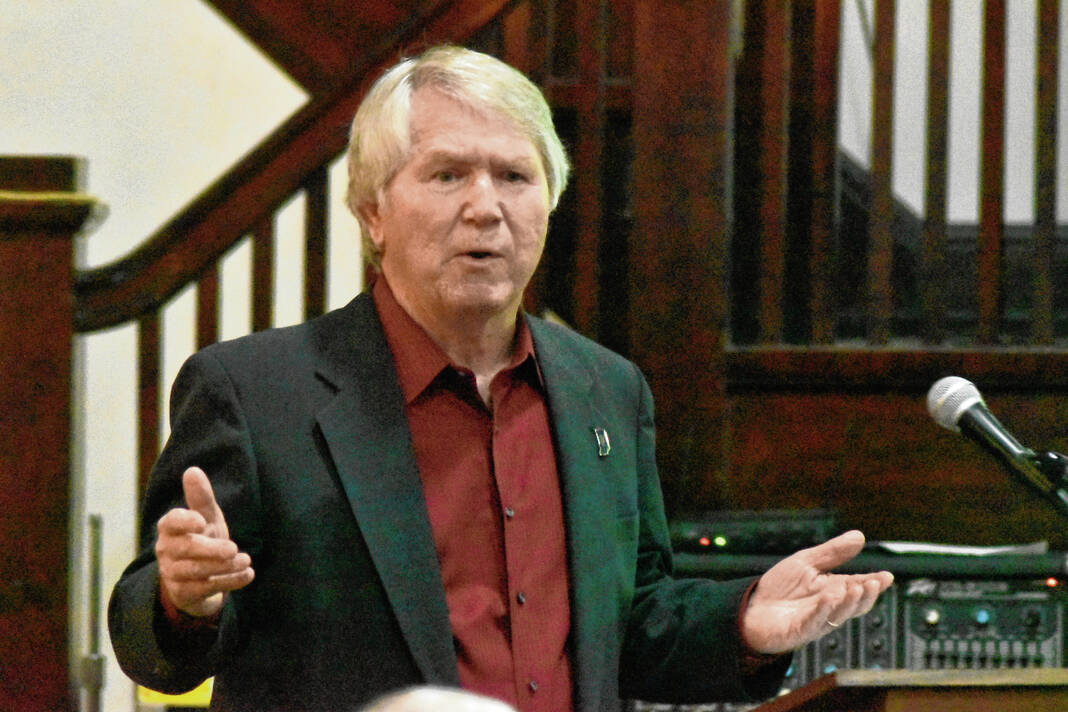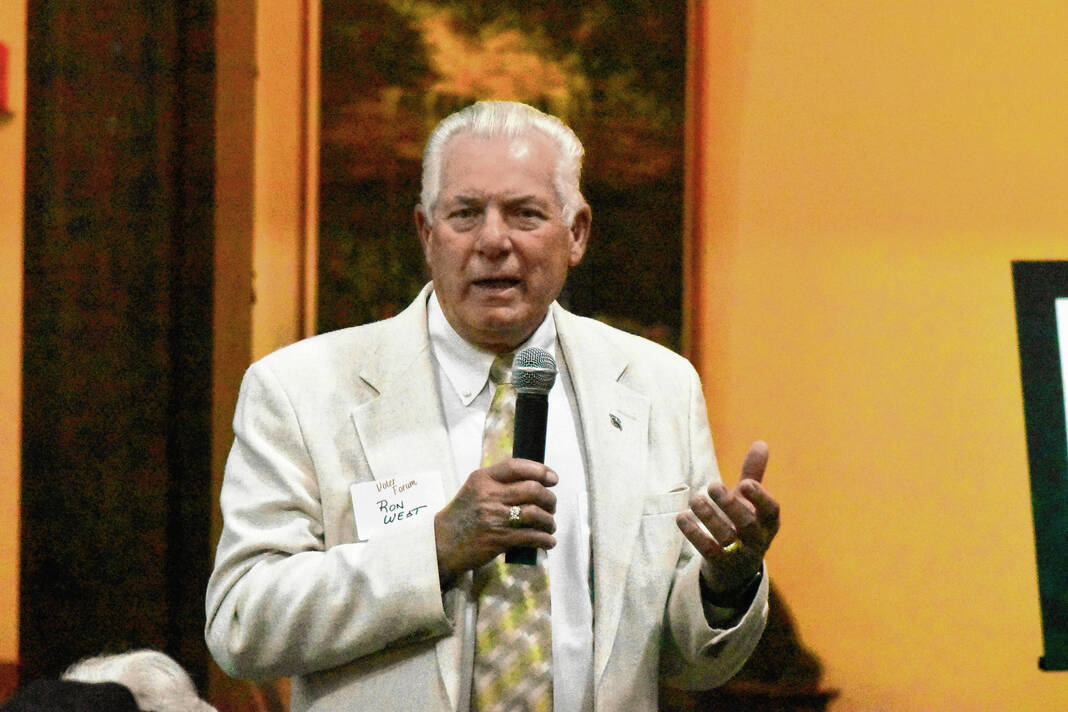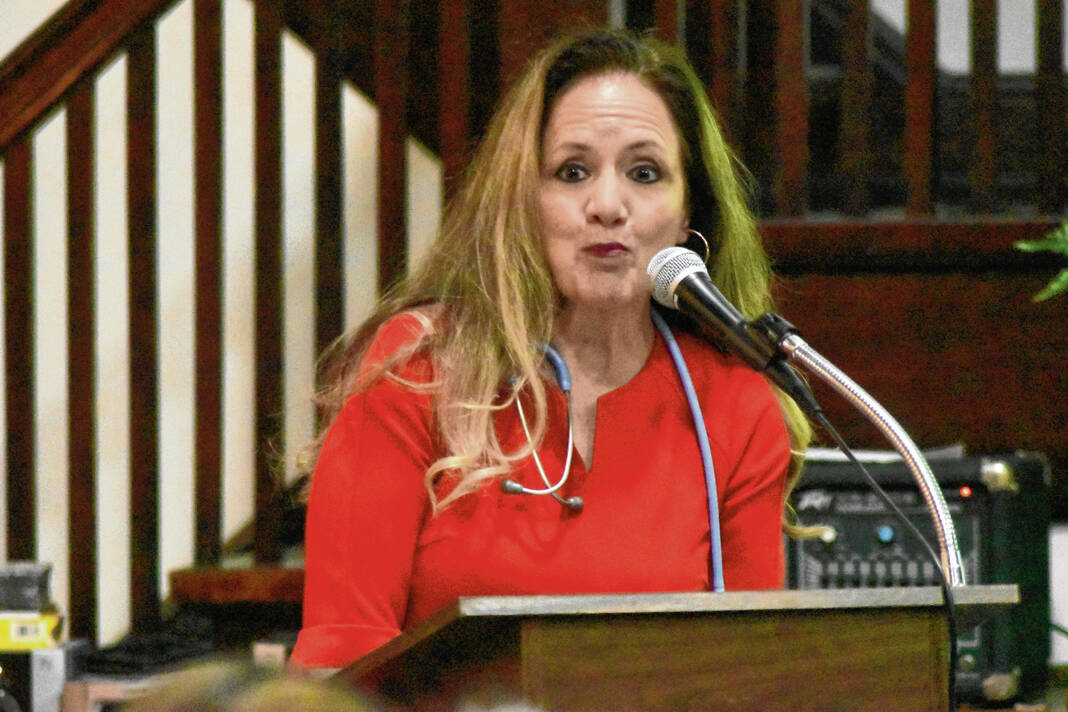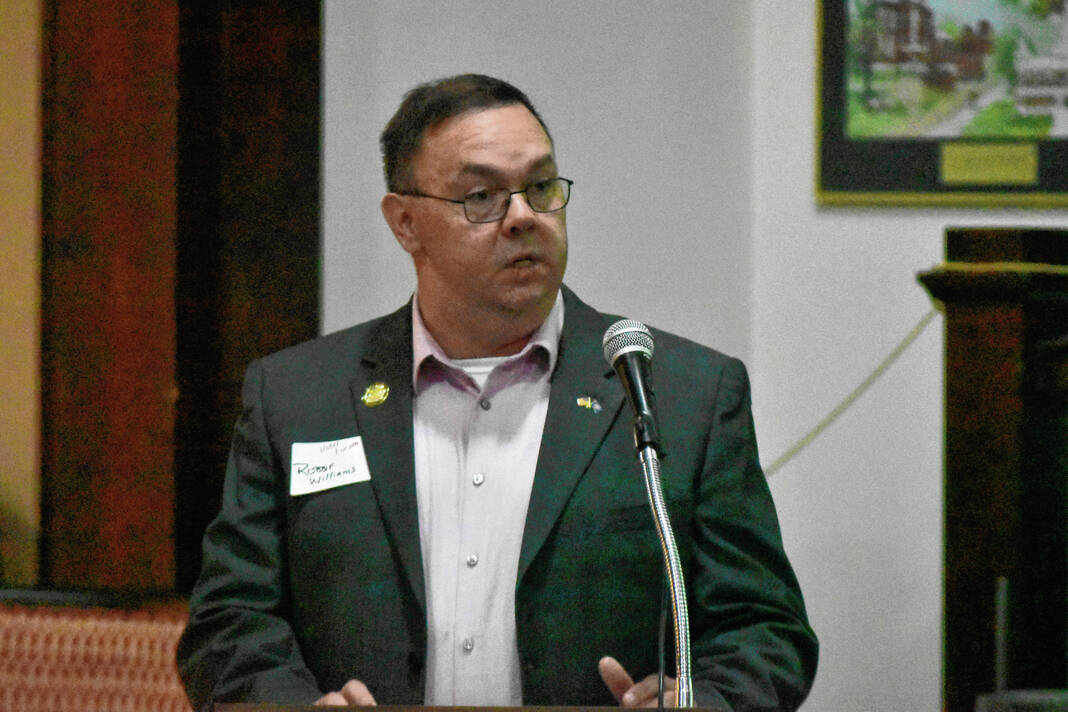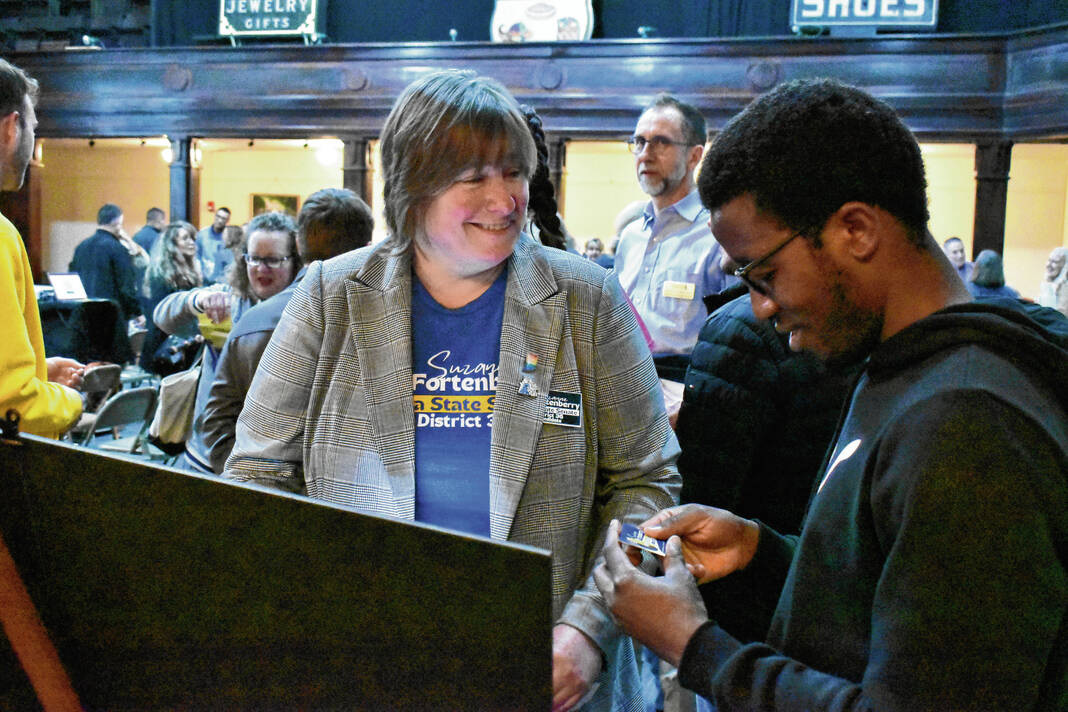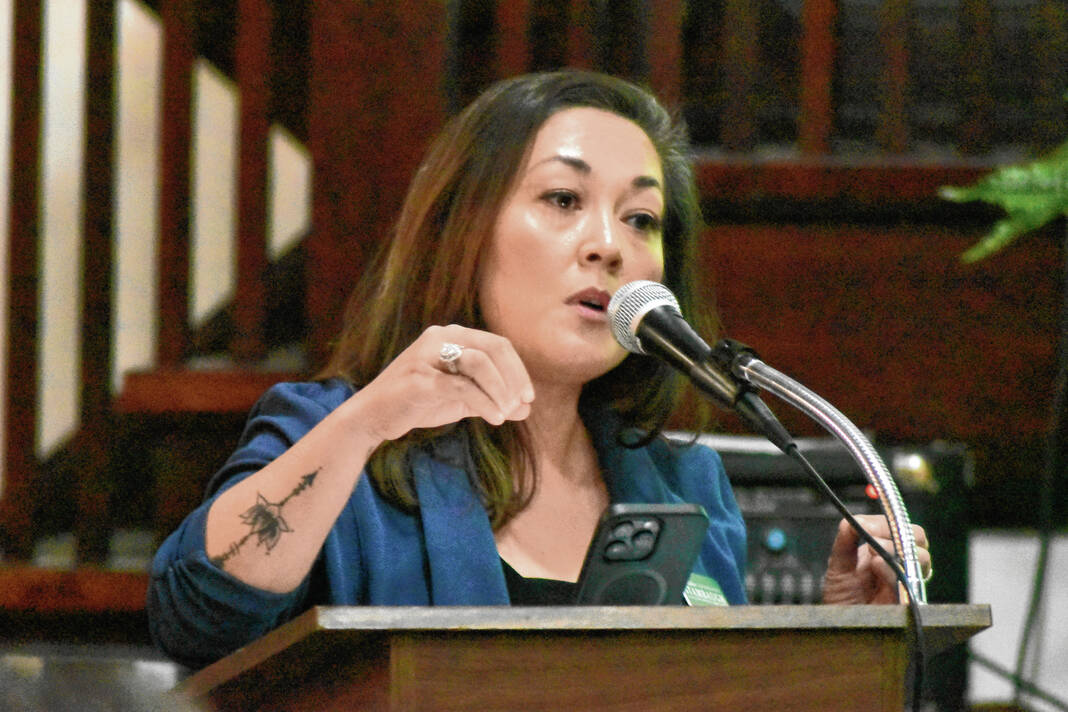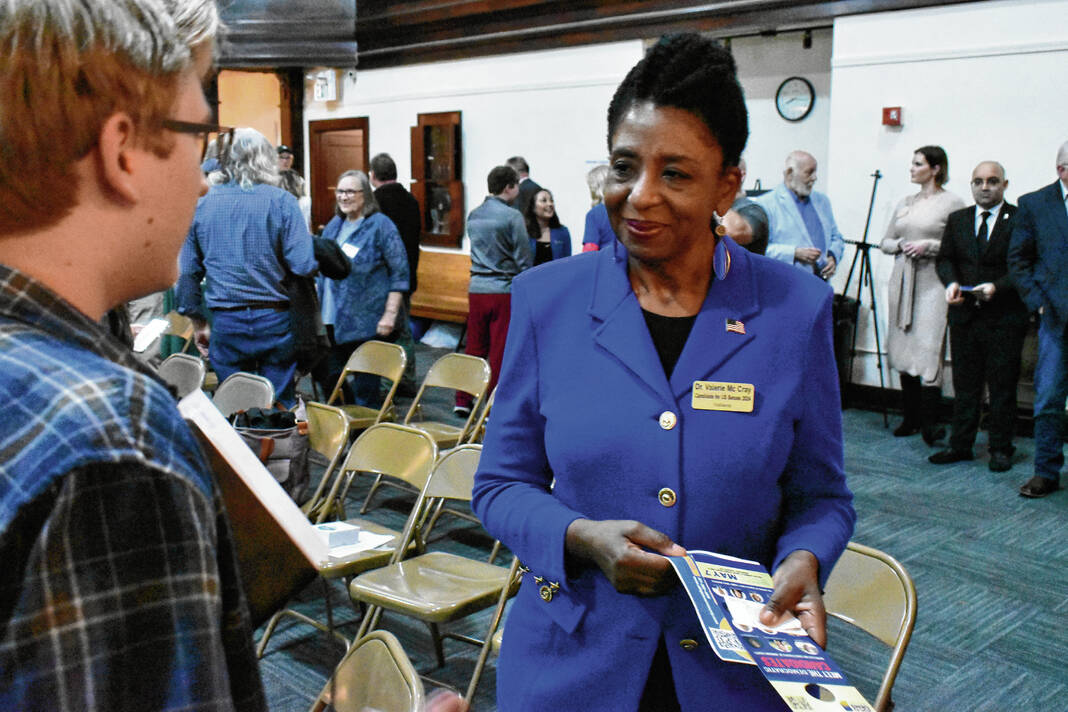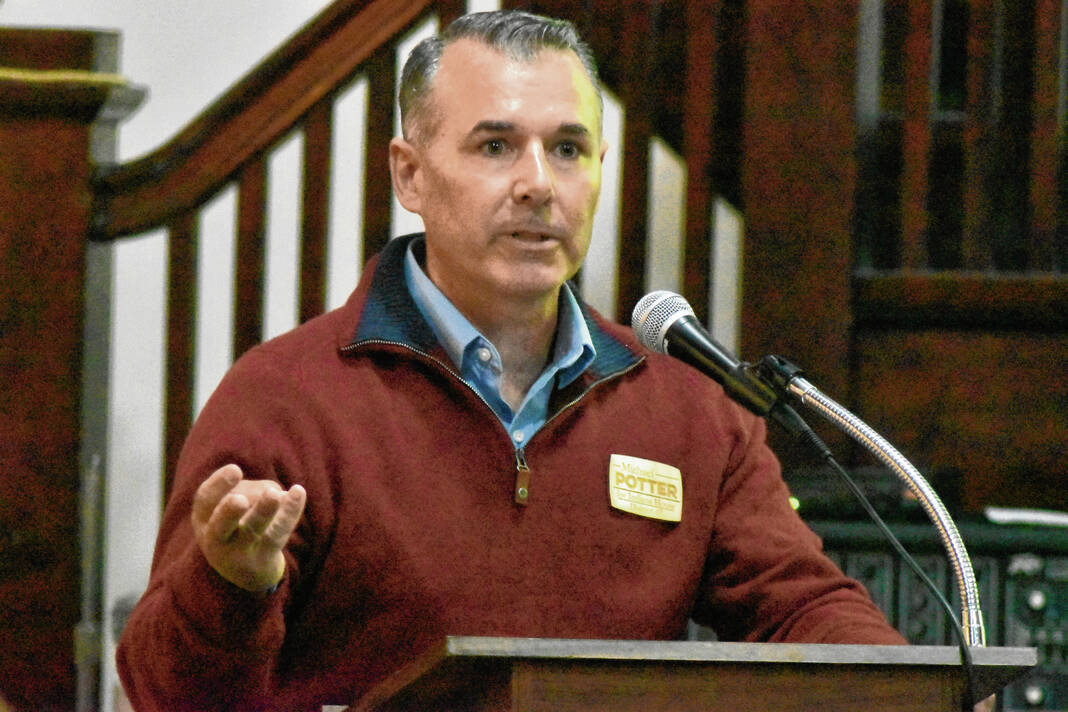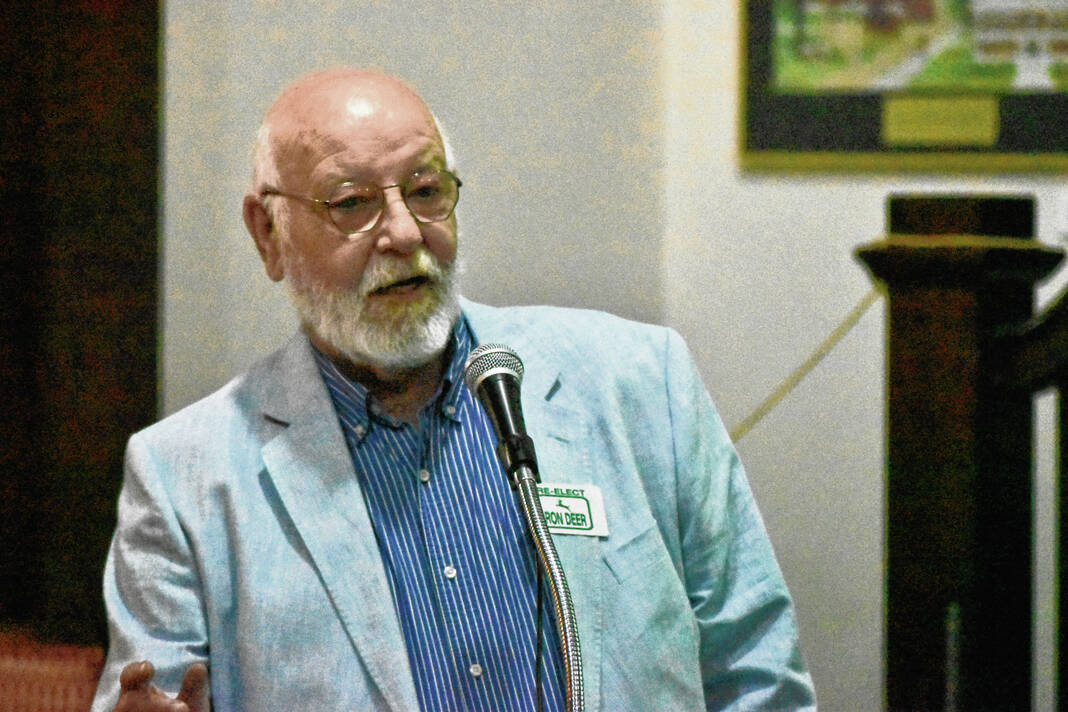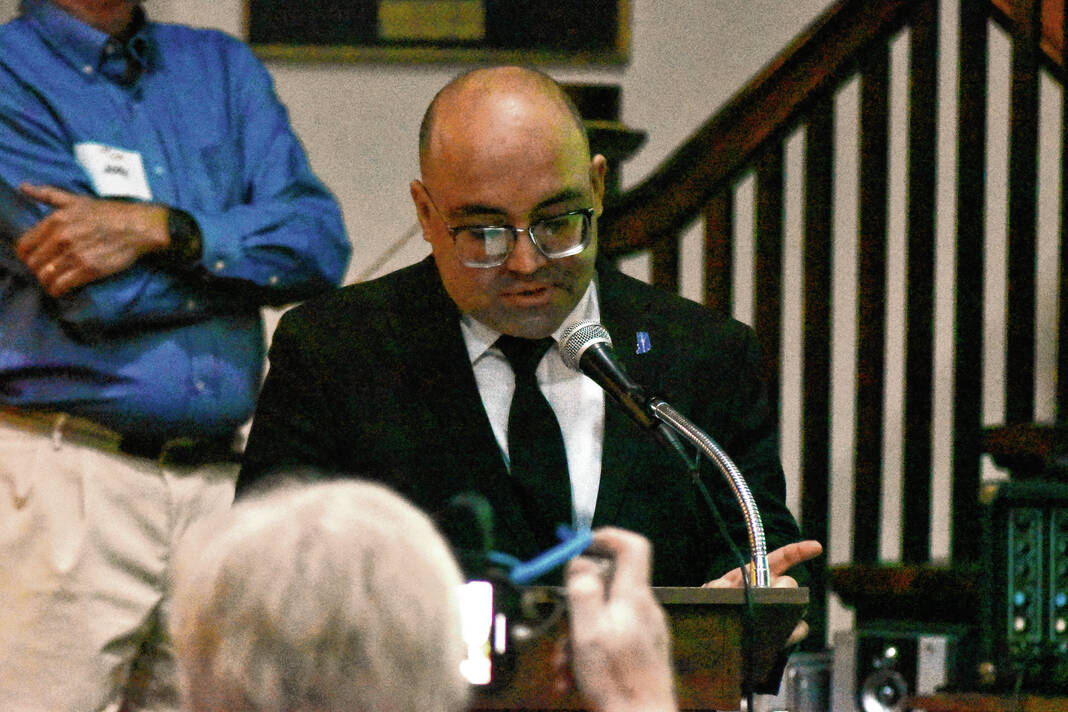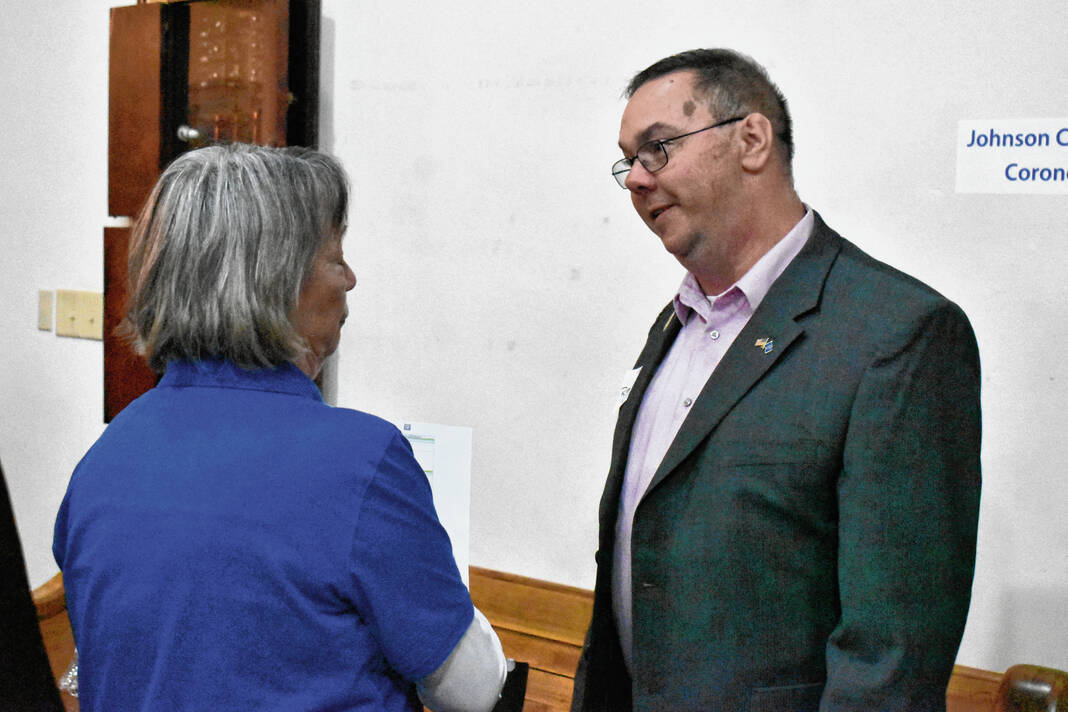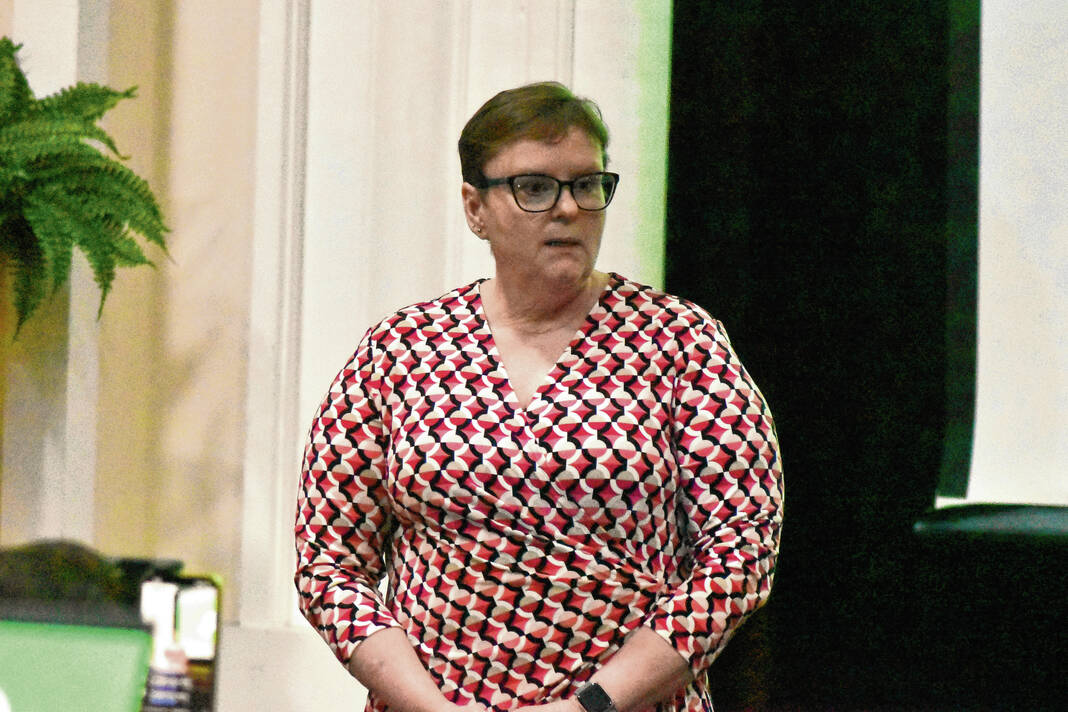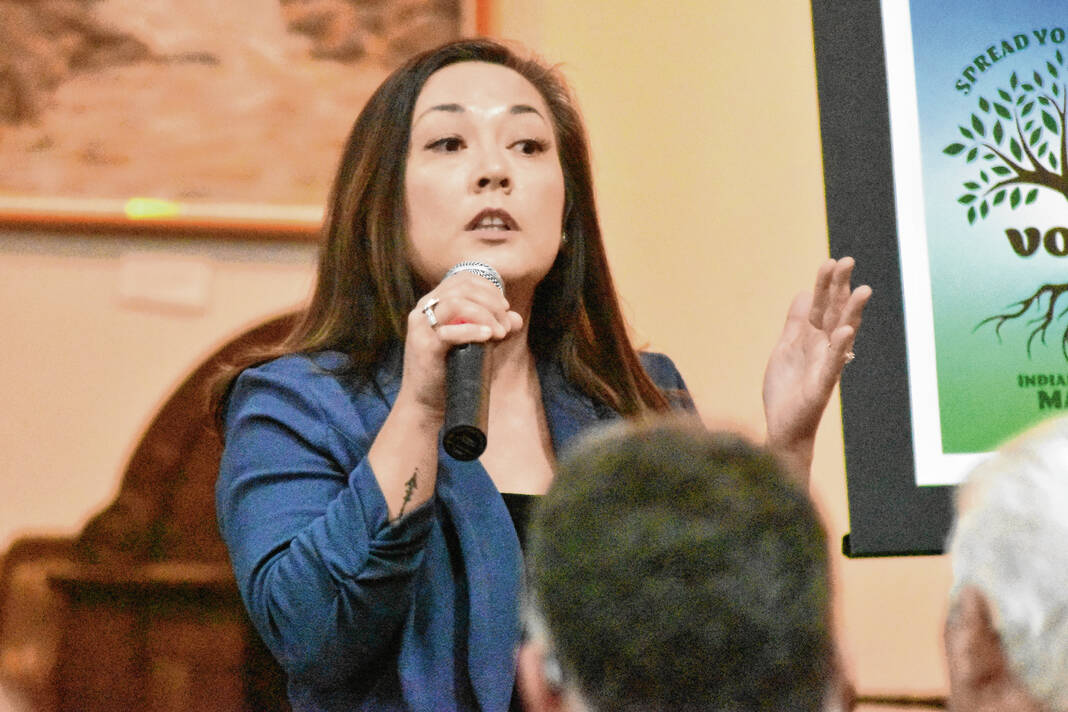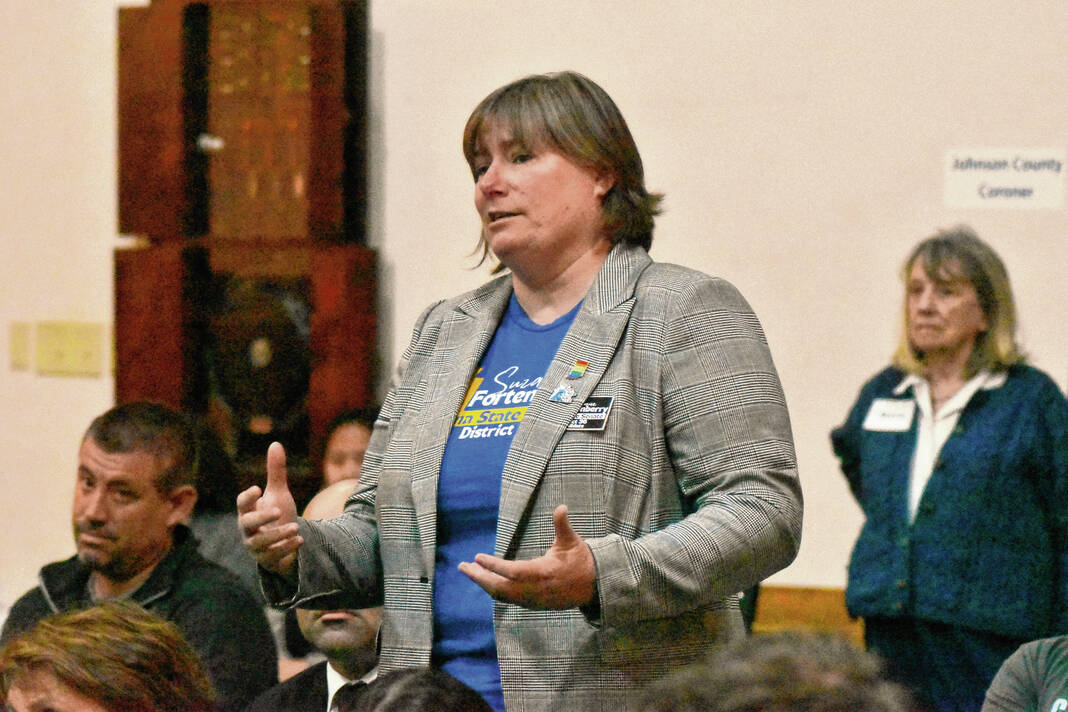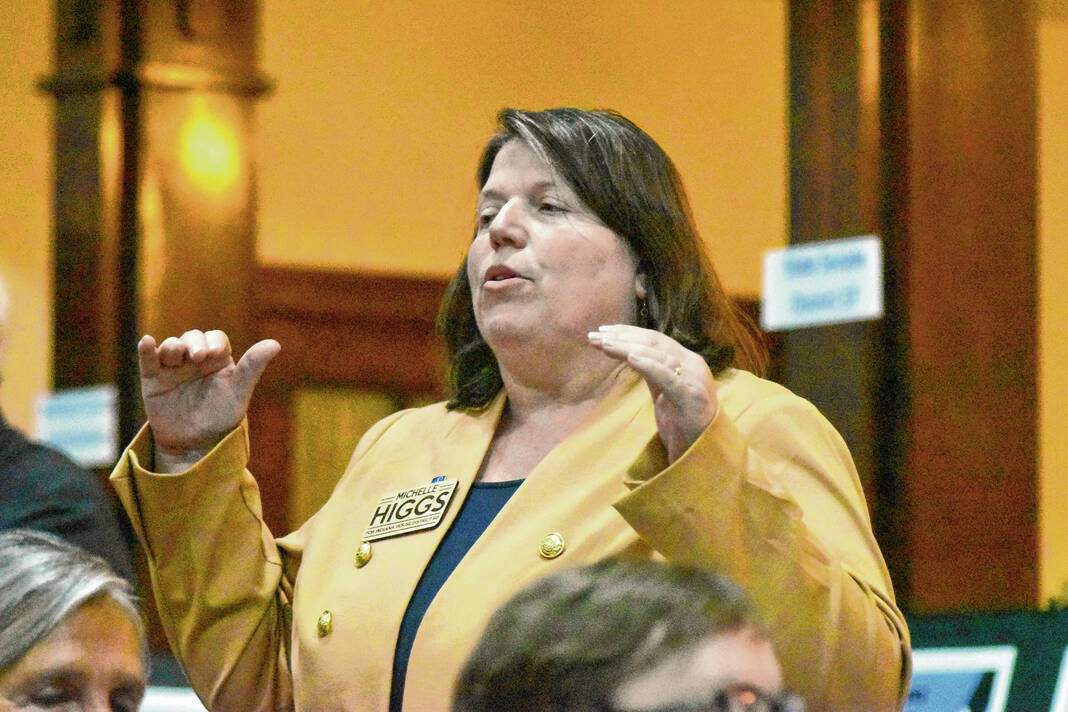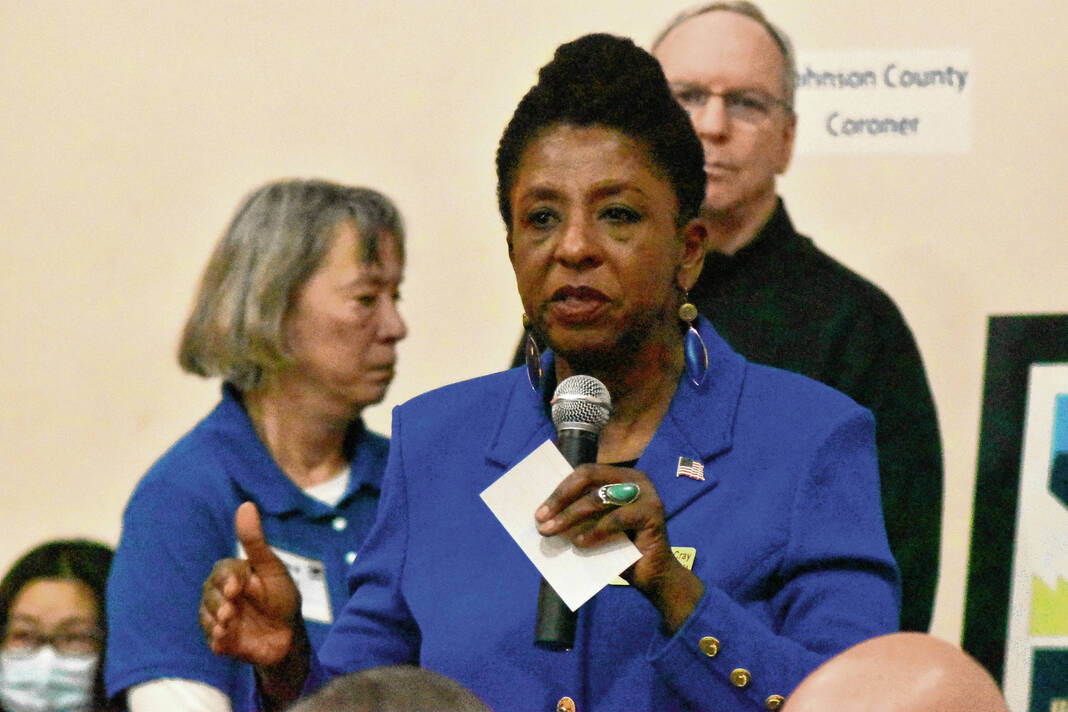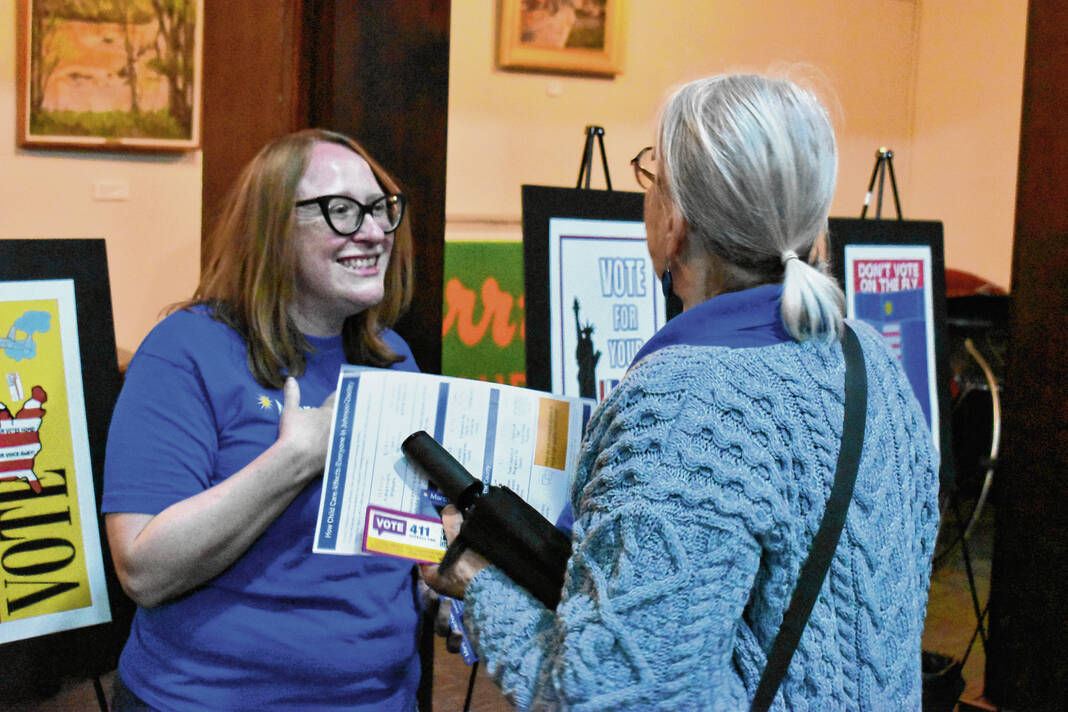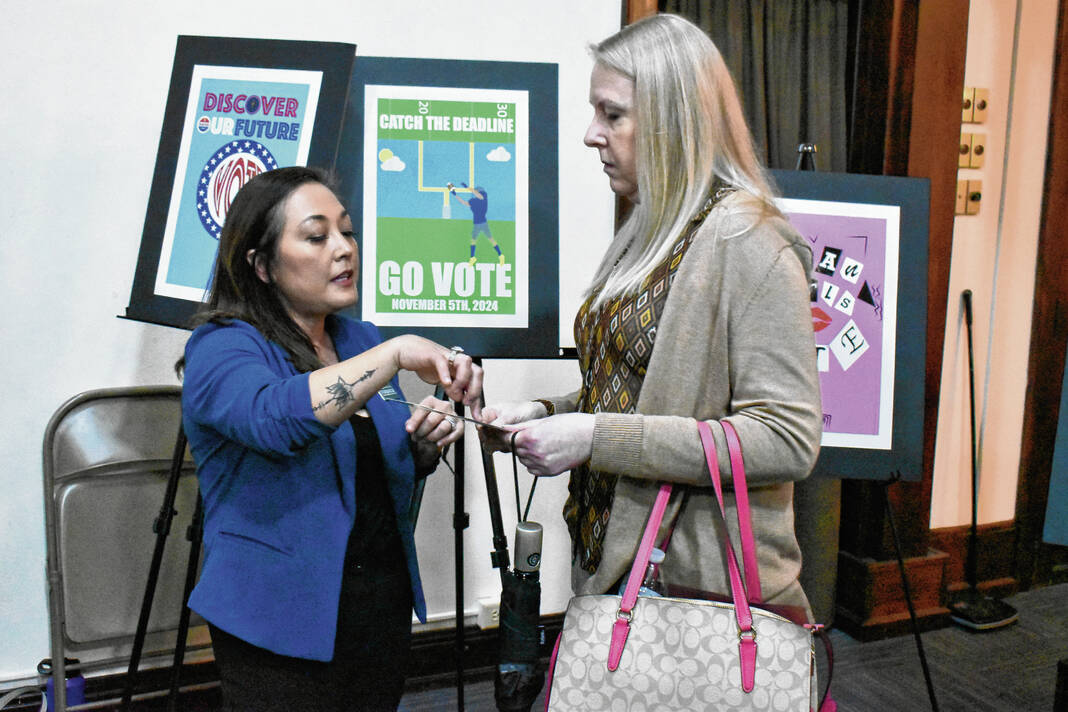About 100 people attended a voter forum at the Johnson County Museum of History last night where candidates and elected officials answered questions about housing, mental health and more.
Candidates running for U.S. Senate, U.S. House of Representatives and the Johnson County offices of commissioner, county council, coroner and judges for Circuit Court and Superior Court 1 were in attendance. The forum was sponsored by Bridges Alliance of Johnson County, the Daily Journal, the League of Women Voters of Johnson County and the Franklin College Political Science Department.
A panel of local residents and leaders shared personal and lived stories of struggles with housing, addiction, difficulty accessing transportation and more. Candidates registered to talk about one of the four topics when they RSVP’d and were selected based on who registered first. Candidates gave 90-second presentations on selected topics. The night finished with voters approaching candidates to ask them questions one-on-one.
Of the around 60 who were invited, 20 candidates said they would attend. However, several of them ran into unforeseen circumstances that night which prevented them from attending.
Voters like Dylan Emberton, a senior at Center Grove High School who will be voting for the first time this May, attended to learn about the candidates and issues, but also to educate his friends who are less interested in voting.
“I thought by going here and doing stuff like this, I could collect info for them and condense it so that they can have an idea of what they want to vote for,” Emberton said.
Several Franklin College students, like Mia Saunders, were in attendance not only to see their voting-themed artwork displayed around the room but to learn more about the candidates and their stance on issues.
Residents like Carole Gall were pleased to see the bipartisan collaboration brought by the event. She was happy to hear from the candidates and it helped her make a decision for the primary.
Housing
Johnson County has an “opportunity crisis” when it comes to housing, said Ross Stackhouse, panelist, pastor of HeavenEarth Church and leader of the Whiteland Tornado Recovery Task Force. Housing prices and average rent prices are increasing at rates double and triple those of wages leading to an “opportunity problem,” Stackhouse said.
Alex Raines, panelist, resident and Circle Leader with Bridges Alliance of Johnson County, discussed how hard it has been trying to find housing while making $15.40 an hour, which is more than double the state minimum wage. Raines broke down his monthly budget and concluded that if he were to rent the cheapest apartment in Franklin, which is around $800 to $900, he would only be able to eat every three days.
Johnson County Council at-large Democratic candidate Saad Tawfeeq said he wants to set standards for affordable housing with a “certain level of quality.” Tawfeeq said he would also work on infrastructure and public safety if elected.
Indiana House District 60 candidate Michelle Higgs, a Democrat, said she is “committed to the truth that every Hoosier deserves a safe and affordable home.” Higgs said she is a small landlord who provides affordable and stable housing for her tenants and has been organizing statewide for the last seven years. If elected, she hopes to pass legislation that protects tenants and curbs rising utility costs, especially for disabled people and senior citizens, she said.
Steve Powell, Johnson County Commissioner District 3 Republican challenger, said he is for affordable housing, but not government-subsidized housing.
“I am in favor of letting the marketplace work,” Powell said.
Getting into government subsidized housing will lead to “unintended consequences” in Johnson County, he said. Powell would aim to make sure housing standards are high and to remove any “unnecessary bureaucratic regulations,” he said. Nonprofits such as United Way of Johnson County’s No Place Called Home program can do a better job addressing homelessness than the government, according to him.
Suzanne Fortenberry, State Senate District 36 Democratic candidate, said three things need to be focused on when it comes to affordable housing: military, renters rights and working together. Fortenberry said military members are getting kicked out of their homes and renters can’t withhold payments to landlords for inhabitable housing. There should be a law in place that keeps people in their homes before it becomes an emergency, she said.
“There needs to be a law in place that we can get more taxpayers the money that they need to stay in their homes instead of cleaning tombstones,” Higgs said.
Charrie Stambaugh, Johnson County Council at-large Democratic candidate, said existing low-income housing isn’t enough for Johnson County’s influx of new residents. She suggested the county work with realtors in encouraging people to apply for federal assistance loans to not be discouraged from buying a house. She also discussed how housing affordability is related to liveable wages and how higher-wage jobs are needed.
“We need good incomes and we need to make sure that folks can continue to grow in their jobs and obtain educational opportunities in those positions as well,” Stambaugh said.
Child care
On the topic of child care, Bev Martin with Bridges Alliance said the shortage of child care and impacts the workforce. She said it took five months for a Circle Leader with Bridges Alliance, a program that helps individuals achieve financial stability, to find childcare. The Circle Leader was approved for Child Care and Development Fund vouchers but had limited options. The children were at the daycare for two weeks before the owner decided to close at 5 p.m.
Martin recalled another client who worked third shift and had no place for her children to go. She could change shifts, but those options are limited as well. Fortunately, the client’s employer allows the child to come to work with her, but those situations are rare, she said. Martin also discussed child care worker wages and a study that projected that childcare workers won’t have jobs in the next five years. She encouraged elected officials to make childcare programs and vouchers more robust.
A representative of Indiana 6th Congressional District Democratic candidate Cinde Wirth said increasing the number of childcare providers, making childcare more affordable and expanding pre-kindergarten and Head Start programs will help with child care issues. Wirth believes workers should be paid a “family-supporting wage,” have access to paid medical leave and benefits and have the right to form a union, the representative said.
Robbie Williams, a Republican candidate for Johnson County Coroner, said the topic is difficult for him to speak on, but he approached it creatively. The coroner’s office helps residents, in all sorts of ways, including providing them with resources, he said. For lack of child care, people could have to quit work, which could eventually lead to substance use and death from an overdose. The coroner can be an advocate for residents and help them figure out ways for the county to be more visible through drug prevention and education.
“If I’m approachable then I can put people on it, I can assist you, I can guide you and I can direct you,” Williams said.
Transportation
Lydia Wales, panelist and Franklin Union Needham Township Trustee recalled her first encounter with Access Johnson County when 17 families needed transportation from a Franklin hotel that was shutting down. The transportation service was able to help take the families who didn’t have transportation to a new temporary home, she said. However, Wales said Access Johnson County is perceived as transportation for the elderly, though it can be used by any county resident.
Wales also talked about families living in hotels and barriers to finding housing and transportation. Before the total solar eclipse, Wales and others went to every hotel in Johnson County to find out how many people were living in them. They found that 74 rooms are being rented anywhere from a week to seven years. People cannot afford to save up for the first month’s rent or a security deposit because they are paying $1500 to $1800 a month to live in a hotel, she said.
Blythe Potter, Johnson County Council at-large Democratic candidate, joked that she despised most of the roads in Johnson County. Potter said she would like to see the county not rely on nonprofits for transportation and would like to see accessibility improved. The county needs to be connected with logical infrastructure that “make sense,” she said. She would like to see safety improvements for community members and emergency workers, she said.
Michael Potter, Indiana House District 47 Democratic candidate, said an intelligent transportation system will help reduce environmental footprints by reducing idling and reducing the number of single-use cars on the road. Johnson County needs better sidewalk infrastructure for people who don’t have cars, he said. Potter also said other cities can manage their transportation and he would not “bring up legislation to legislate transportation in cities that are not relevant” to him in the statehouse.
Ron West, the Republican incumbent for Johnson County Commissioner District 3, wants more people to be aware of Johnson County Senior Services and the transportation they offer in addition to Access Johnson County. West also talked about the restrictions of some highway funds and how taxes, such as the gas tax help fund the highway department. County officials are doing the best they can to fix up roads as quickly as they can, he said.
Ron Deer, Republican incumbent for Johnson County Council at-large, wanted to make it clear that the council is working to fix up roads. However, the reality is, with the current revenue streams, it would take 46 years to fix roads appropriately all around the county. Deer said the county is applying for federal and state grants and will continue to do so. He also pledged, if reelected, he would do everything he could to make sure necessary and available funds were appropriated to improve infrastructure.
Mental Health
Kaleb Lane, a peer recovery coach with Upstream Prevention, spoke about mental health challenges and his personal story with addiction recovery. Lane’s story isn’t much different from most people, he said. He was prescribed opioids at 18 and began “a decade-long journey of finding recovery,” he said. Lane got treatment and found recovery in Johnson County through a recovery house in Greenwood, he said. The recovery communities in Johnson County are stronger than people give them credit for, he said.
Lane also highlighted mental health professional-to-person discrepancies and hurdles that people may have to jump through with insurance.
Sandy James, Indiana House District 58 Democratic candidate wants people to know that students are struggling with mental health. She has intervened after speaking with 10 suicidal students in her 30 years as an educator, she said. If elected, James wants to increase available and licensed counselors in schools. James specified she wants people trained in mental health — not pastors or priests — to help with students in crisis.
Dr. Valerie McCray, U.S. Senate Democratic candidate, said a mental health lens needs to be put on every piece of legislation. McCray’s experience as a psychologist has allowed her to see where things go wrong when it comes to mental health, she said. Everything from homelessness to constitutional rights has a mental health component and she hopes to bring that to the forefront, she said.
Andy Roesener, the Republican incumbent for Johnson County Circuit Court Judge, said the position “aligns at the intersection of health issues and substance issues.” As the judge for the county’s drug problem solving court, Roesener sees these issues in cases before him every day and they can be the hardest decisions a judge has to make. Roesener highlighted Johnson County’s drug and mental health courts as a way the judges are helping build support and encouragement for people in these situations, he said.
Melinda Griesemer, Republican incumbent for Johnson County Council at-large, said she is proud to have been part of the council that appropriated $11 million in American Rescue and Recovery Act Funds for a mental health wing at Johnson Memorial Hospital. As a health care professional, Griesemer understands personally how mental health affects everyone. Griesemer wants to work toward making Johnson County a premier place for mental health treatment and research.
Griesemer also touched on other issues such as support incentives for companies to offer employees child care, and supporting felons in finding quality work beyond felon-friendly companies, she said.
Brandi Foster Kirkendall, current Johnson County Magistrate and Republican candidate for Johnson Superior Court No. 1 Judge, presides over the mental health specialty court. She said it takes a team effort between other elected officials to generate and implement ideas like the specialty courts and make sure they work for the people who need them. Elected officials and community members need to “buy in to be able to get the resources” that Johnson County needs, she said.


